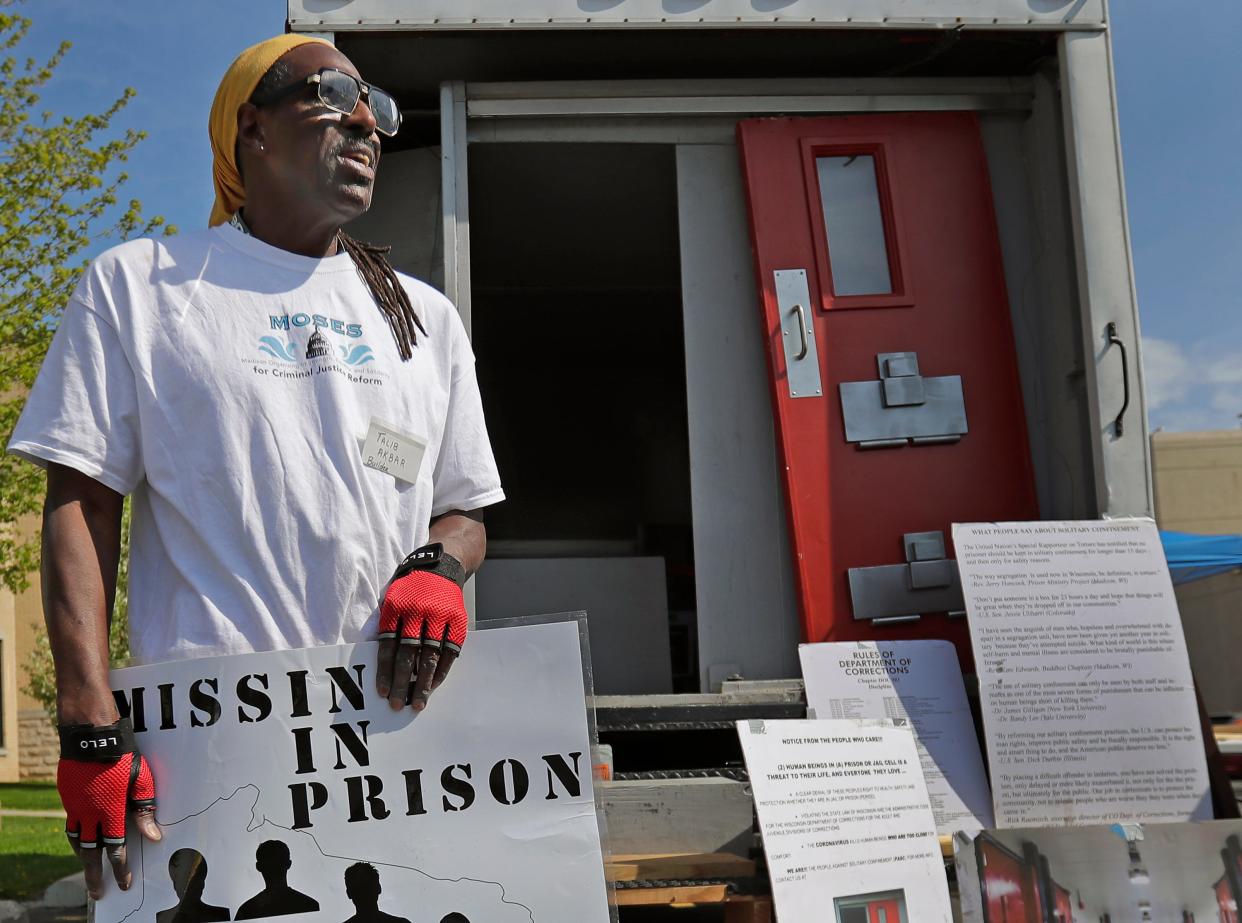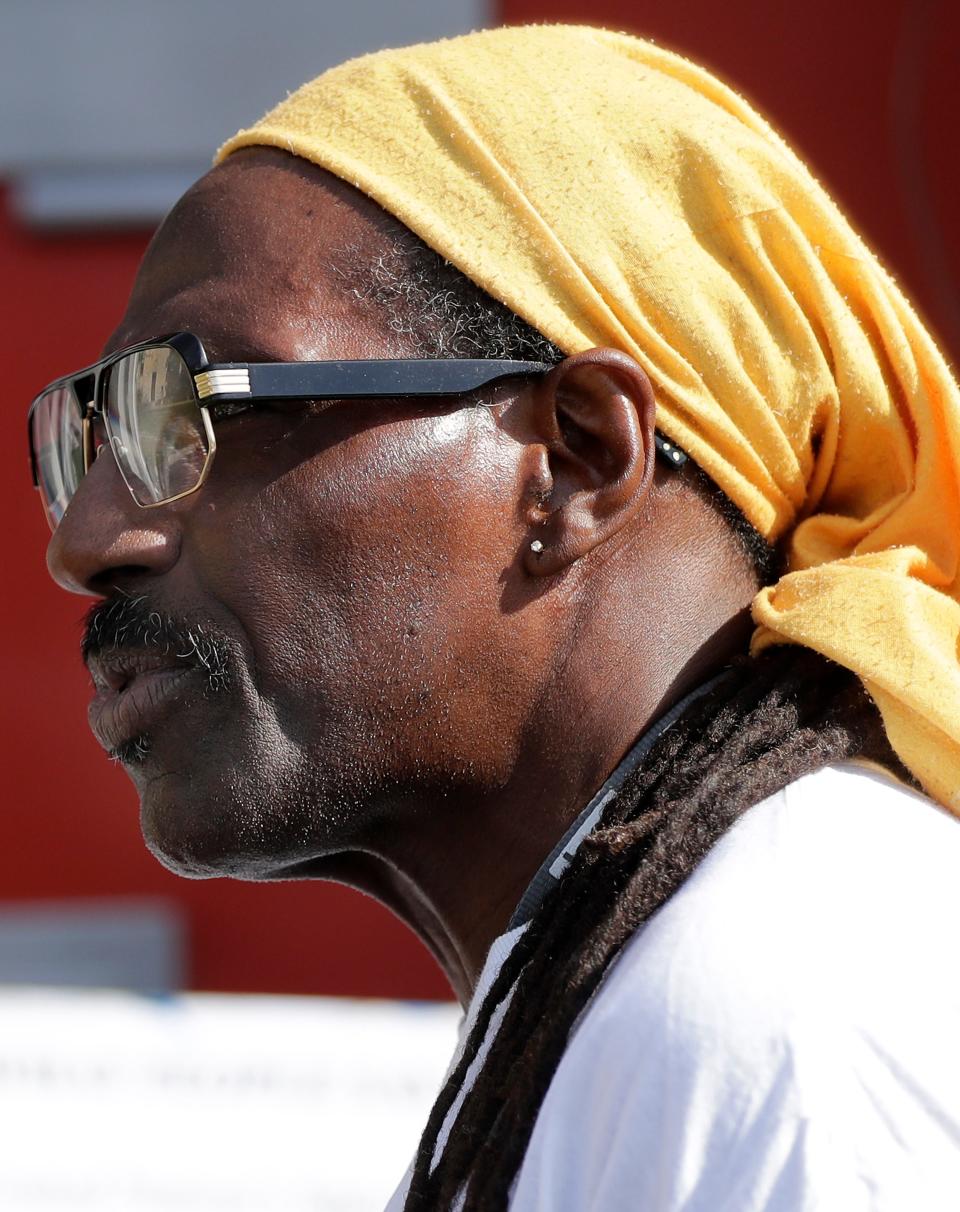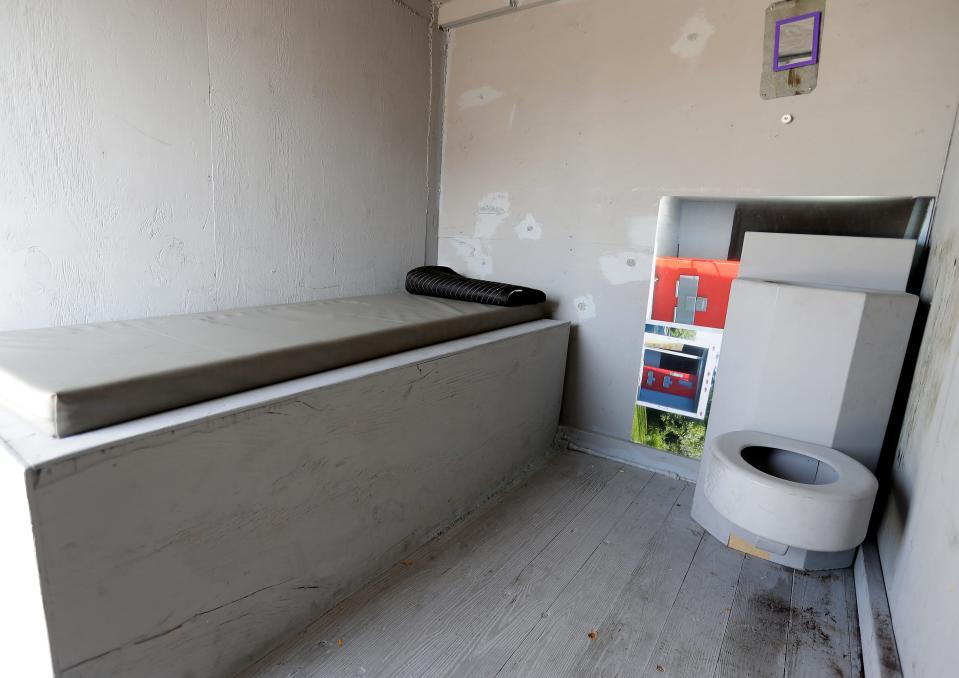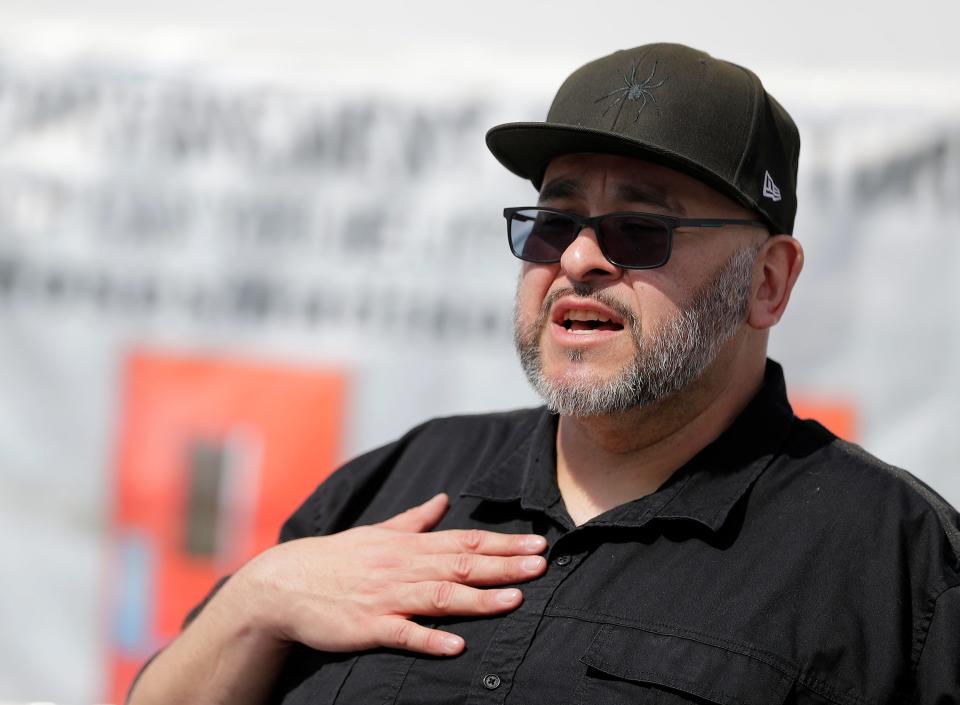Traveling solitary confinement cell replica raises awareness of treatment former inmate says is torture

APPLETON – With the sun beaming down Thursday morning, organizers of social justice nonprofit ESTHER set up a tent, tables and signs next to a trailer in the parking lot of St. Joseph Catholic Church. Despite the beautiful weather, the organizers encouraged people to sit inside.
The purpose? Inviting people to get a small taste of solitary confinement, a prison and jail practice that is the reality for prisoners all over the United States.
ESTHER is a Fox Valley-based interfaith organization that focuses on social justice advocacy, with initiatives addressing topics like the criminal justice system, homelessness, mental health, environmental justice, immigration and public transportation.
People can sign up to sit in the cell for 15-minute or 1-hour time slots during the event, which runs again from 10 a.m. to 6 p.m. Friday. It will then be taken to Green Bay, for an event hosted by JOSHUA, one of ESTHER's sister organizations.
The traveling solitary confinement cell replica is an initiative run by Talib Akbar, a Madison man originally from Mississippi, who spent 20 years behind bars. During his time incarcerated, Akbar had multiple stints in solitary confinement. He now takes the cell replica around Wisconsin to show people what it's like to be confined in a tiny room for 23 hours a day. It's complete with a bed, a pretend toilet and an audio recording of the sounds of other inmates howling from nearby solitary confinement cells.
At the tables next to the trailer were flyers and informational posters, as well as art created by incarcerated people on display and poetry and essays written by people in solitary.
Akbar said spreading awareness of the reality of solitary confinement, also known as segregation or "seg," is what gives him motivation since his release.
In 2011, a United Nations expert reported that solitary confinement — defined as a situation where an inmate is placed in isolation of other people, except guards, for at least 22 hours a day — lasting longer than 15 consecutive days constitutes torture.

"Solitary confinement is torture," Akbar said. "Some people don't have the power to last a long time — some people are in there for years."
In 1995, Akbar was sentenced to 20 years in prison for second-degree sexual assault. While serving time at Waupun Correctional Institution and the Wisconsin Secure Program Facility in Boscobel, Akbar spent 10 stints in solitary, the longest lasting nine months.
It was during a stint in solitary at Boscobel that Akbar sketched a picture of his cell. Correctional officers confiscated the drawing and wrote him a ticket for it. Later, in solitary confinement at Waupun, he again drew his cell and mailed it to a lawyer friend.
The drawing — and Akbar's memory of time spent in "the hole" — became the basis for a replica that was created at Edgewood College in Madison for the purpose of letting people get a glimpse of the solitary confinement experience. Akbar said the idea for the replica came from the Rev. Jerry Hancock, director of the Prison Ministry Project, an outreach program based at First Congregational United Church of Christ in Madison.
Since around 2015, Akbar has been traveling with the cell replica — now a different, more portable one, slightly smaller than the original to-scale 10-foot-by-6-foot replica — advocating for change in the criminal justice system. He is the vice president of WISDOM, a statewide network of organizations addressing social justice needs in Wisconsin communities and the parent organization of ESTHER, as well as the former vice president of MOSES, the Madison affiliate of WISDOM.

A 2021 report from Yale Law School found that between 41,000 and 48,000 prison inmates across the United States were in restrictive housing units. That number doesn't include jail inmates also placed in segregation; the number is not reported, since there is no nationwide tracking of county jails' uses of solitary.
In Wisconsin prisons, rule violations can give inmates up to 90 days of "disciplinary separation," according to guidelines from the Wisconsin Department of Corrections.
"We have to find a better way to do it, because what's at stake is the humanity of other people," Akbar said.
Akbar wasn't the only formerly incarcerated person at Thursday's event. Bobby Ayala, a member of EXPO, Ex-Incarcerated People Organizing, who is out on parole for a 60-year sentence for multiple charges including first-degree reckless homicide when he was 18, was also at the event and shared his experiences with solitary confinement. He said the solitary confinement cell tour is his first event he has attended with EXPO, which is another affiliate of WISDOM.
Ayala was imprisoned for 27 years and was let out on parole in the fall of 2020. While incarcerated, he was transferred between multiple prisons, including the Green Bay Correctional Institution, Dodge Correctional Institution, Racine Correctional Institution, Redgranite Correctional Institution and Columbia Correctional Institution in Portage. In that time, he said he was sent to solitary confinement on multiple occasions.
"In there, I never counted time. I never counted dates, I never put a date, like, 'Oh, I got five more days,' you know, I don't do that, because it mentally messes you up," Ayala said. "I guesstimate that I've done like six, seven years in seg."

The longest time Ayala spent in a single solitary stint was two years, which he served at Racine Correctional Institution early on in his sentence. He said the lights were kept off at all hours of the day and there was a rule against talking. Inmates were given only cold water, never hot, and had meals slid through a door, which sometimes caused food to spill.
Sometimes, Ayala said, correctional officers would send people to segregation if they only suspected them of breaking a prison rule. This practice, known as "temporary lockup," could keep people in the solitary cell for up to three weeks without even receiving a ticket for behavior if they did not commit any infraction.
"I had that done to me many times," Ayala said.
Some of Ayala's segregation experiences were in double cells. He said many of the people who repeatedly were sent to segregation cells dealt with mental health issues. Ayala recalled once that he spent time in segregation with a cellmate who went a full weekend without receiving antipsychotic medication because the jail had forgotten to renew it and the doctor was unavailable until Monday.
A member of the Ojibwe tribe, Ayala said he relied on his spirituality when stuck in segregation and was able to help other Native inmates when they were going through difficult periods in their lives.
He also said he read many religious and legal books while in solitary. To help pass the time, he would pace, sing songs and once drew an entertainment center on paper, complete with a hand-drawn radio, a TV, speakers and a remote.
It's not only prisons that separate incarcerated people from the rest of the population for the purpose of discipline; jails also use the tactic. Each county jail has its own rules and is not required to report on the usage of solitary in the same way state prisons do, said Lisa Hanneman, co-chair of ESTHER's transformational justice task force.
In Outagamie County jail, inmates can be moved to segregation for a maximum of 10 days, Outagamie County Sheriff's Lt. Lance Willson said.
After those 10 days, inmates go through "a reintroduction to the general population," incrementally regaining privileges depending on their behavior, Willson said.
Some states have in recent years taken efforts to limit long-term solitary confinement practices in jails and prisons, which studies have reported do not help significantly in rehabilitation and can cause lasting harm, particularly to people who are mentally ill.
In 2017, Colorado ended practices of long-term solitary confinement and made the maximum stays for prisoners who violate any sort of prison rules 15 days. In 2019, 28 states introduced legislation limiting usage of solitary confinement, according to the American Civil Liberties Union. Wisconsin was not one of them.
"People are sent to prison as punishment, not to be punished," Akbar said.
Akbar said he hopes for legislative change to eliminate excessive use of solitary confinement in Wisconsin. There is currently none in the works. Wisconsin State Senator Lena Taylor introduced a bill in 2017 that would have banned solitary confinement for inmates under 18, but it never passed.
"Maybe we can change something in the future," Hanneman said. "But we definitely need to make people aware that it's happening, and that there is administrative rules about how long someone should sit in a solitary cell."
Akbar also thinks its important to elect officials that could bring about change.
"It just has to be put on the table that this treatment is abusive," Akbar said. "There's another way to do it, you know. Bringing a new sheriff in town, things change. You just have to put new people at the helm of it."
Contact Kelli Arseneau at (920) 213-3721 or karseneau@gannett.com. Follow her on Twitter at @ArseneauKelli.

SUPPORT LOCAL JOURNALISM: Our subscribers make this coverage possible. Subscribe to a USA TODAY NETWORK-Wisconsin site today with one of our special offers and support local journalism.
This article originally appeared on Appleton Post-Crescent: Traveling solitary confinement cell replica raises awareness of what former inmate calls torture

